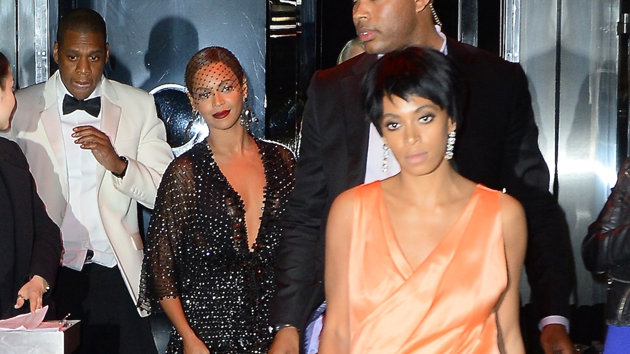What happens at home usually stays at home, but in this case what happened in an elevator made its rounds for the whole world to see.
After a physical altercation took place between Solange Knowles and Jay Z, social media joyfully exploded—with hashtags like #WhatJaySaidToSolange and enough memes to last a lifetime—for a chance to pick, prod, and place blame on individuals who once appeared to have a picture-perfect life. We all know that family business can be particularly messy, especially when every move is under heightened scrutiny. The Knowles-Carters’ have always known this to be true.
I have battled with the idea of writing a response about the infamous elevator scene with Solange, Jay Z, and Beyoncé since Monday afternoon. My hesitation was because family business, regardless of celebrity status, is deeply personal.
Despite not confirming or denying the media’s speculations of what occurred following the Met Gala 2014, one constant remained true: black people are damned if they do, damned if they don’t.
Let me be abundantly clear in saying that this article is not promoting, tolerating, or otherwise advocating for violence. And although the faces of victims of violence are disparately women, I am going to state the obvious: Men, too, can be victims of physical assault (as illustrated in the Jay Z/Solange incident). But what I have found most troubling are the reactions to Solange and Beyoncé for being “crazy” and “robotic,” respectively, while seemingly praising Jay Z and offering him a full range of cookies for not retaliating and physically striking Solange.
As a man, I can’t fathom a time when I would find it reasonable to hit a woman.
What I have noticed occurring is a knee-jerk reaction to assume Solange was “crazy” without having any facts. We must find ways to discuss physical assault without pathologizing Solange and, by extension, all black women. Not to mention that it is vital to learn how we can support those on the receiving end of physical assault without throwing roses at Jay Z’s feet.
Anyone with access to the Internet can easily determine that Jay Z has been on the receiving end of many “jokes” due to Solange’s assault. Making jokes about victims of assault, gender notwithstanding, will always be problematic. But I also refuse to give a standing ovation for not hitting a woman. Granted, Jay Z’s patience with women has vastly improved since 2004, which possibly shows signs of progress, but it isn’t something to be privileged.
There are three main concepts I have observed from the social media reactions:
- Solange was crazy for acting the way she did.
- Jay Z must have done something to make her angry.
- Beyoncé should have done something.
Solange was crazy for acting the way she did. There is probably not a right moment to physically assault someone because we get angry—then again, we are human. If anything, this means we must equip ourselves with tools, language, and additional ways of dealing with emotions. But diminishing a reaction as “crazy” simply because it involved a woman only diminishes what could be a reasonable and logical emotional response.
Unfortunately, however, black women are familiar with this critique as they are often used as tropes to describe the intersection of their race and gender. Automatically dismissing Solange’s response as “crazy” is simply a way to silence her emotional response. And yes, this label would have likely been placed onto her with or without physical violence.
Jay Z must have done something to make her angry. Maybe, maybe not. As dangerous as it is to assume Solange was “crazy” for attacking Jay Z, it is equally as negligent to assume he did something—or did nothing for that matter. We only know what we saw, and as such, it is important to support what looks like a private family rift made public.
Beyoncé should have done something. When is the last time you have been one of the most famous people in the world, stuck on possibly the longest elevator ride, while your sister and husband are getting into a physical altercation? Probably never. And when is the last time your squabble was leaked and aired for millions to see? Probably never. This isn’t to say we shouldn’t be fascinated by this story, and surely celebrities have given up some of their privacy by stepping into the limelight, but this doesn’t mean their humanity should be diminished. It is relatively easy to have the “if I were her” conversation when we are not the person experiencing the situation. A person not reacting the way we expected them to react does not make them a robot. In fact, it is overwhelmingly clear that it makes them human.
At the core of the media’s response to normalizing violence, particularly when it is between men and women, is social norms, patriarchal conditioning, and gender roles/expectations. We must figure out how to have a nuanced conversation about the myriad ways we perpetuate violence—one without the Oppression Olympics, GIFs, and memes.
While it is easy to joke about, discuss, and otherwise pick sides of this event, I have learned one invaluable lesson from watching the elevator scene and our immediate reactions: We have a lot to work on, and sadly, none of it involves Solange, Beyoncé, or Jay Z.
Preston Mitchum is a regular contributor to Role Reboot. He is a civil rights advocate and legal writing professor in Washington, DC. Preston has written for The Atlantic, theGrio, Huffington Post, Ebony.com, and Think Progress. Follow him on Twitter @PrestonMitchum.
Related Links:

